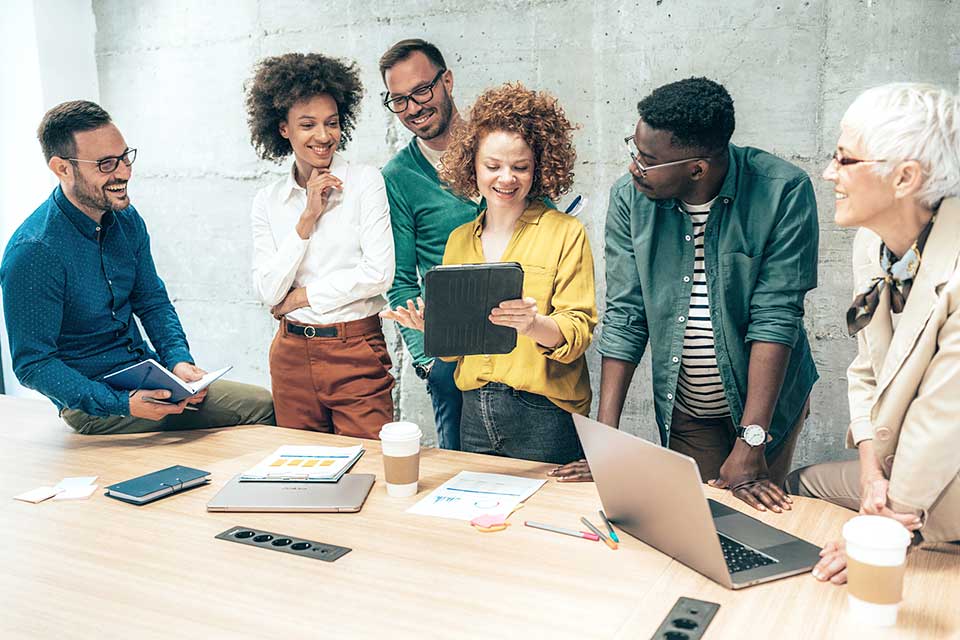Connected Realities Courses
Participation Across Differences
- Understand how social identities and interpersonal dynamics impact meetings and can lead to inequitable participation.
- Discover how our individual social identities impact how we facilitate.
- Create an inclusive meeting environment for all, including how to avoid creating barriers to participation.
- Create space for participants to hear and understand each other across their differences and perspectives, and move toward achieving desired team outcomes.
Leading Productive Groups In Public Participation
- Recognize common challenges and specific sources of difficulty in group processes, and apply creative and sustainable tools for conflict transformation.
- Evaluate your personal role in encouraging and inhibiting positive group behavior and growth.
- Recognize how individual and interpersonal differences show up in groups and learn how to employ differences to the group’s advantage.
- Demonstrate proven facilitation techniques that encourage participation across differences, including constructive communication, co-creative participation, inspired visioning, and authentic engagement.
- Learn to engage diverse people with diverse personalities, perspectives, and strengths as you help a group chart a path forward and work toward their goals.
Setting the Table for Equitable Participation
In this session, we will explore key questions that help us design and facilitate equitable participatory processes. We’ll identify the barriers to equitable public participation, how they are created, and how to overcome them, including how to uncover and meet the participation needs of diverse community members. These techniques will prepare us to create environments for real and sustainable connections.
How do we get the right people at the table? We often ask this question as we strive for diversity and inclusion in our planning processes. Yet there are deeper, identity-rooted questions we need to ask to reach an equitable level of participation. In this session, we will explore common barriers to equitable participation, where they come from, and how to overcome them. Learn how to set a table for your planning process that truly engages everyone around it.
Learning Objectives
- Examine “the table”, the shared space of dialogue in participatory processes, and the contextual factors that impact the equity of a meeting venue.
- Understand core human needs and how they affect the perception and behavior of participants and facilitators during participatory processes.
- Employ techniques that dive deep into participants’ feelings, beliefs, ideas, attitudes, social identities, and assumptions and create a foundation for equitable participation.
- Determine how our own social identities create areas of unawareness that may create barriers to participation in the processes we design and facilitate.
- Identify and use tools to eliminate barriers to participation.
- Differentiate between processes that are diverse, inclusive, equitable, and transformative.
- Reevaluate planning processes from the standpoint of transformation.
Dealing with Difficult Behaviors in Meetings
Learning Outcomes
- Define and describe variations of difficult behavior.
- Understand common and core human needs that underlie difficult behavior.
- Know how to use meeting design as a way to meet participants’ needs, and as a prevention for difficult behavior.
- Be able to use intervention techniques when difficult behaviors show up in meetings.
- Learn how to co-create and use group agreements to prevent disruptions and keep meetings from being derailed.
The Social Intelligence of Facilitators
- Understand how individual social identities and experiences influence the ways we design and facilitate meetings.
- Know what it means to be self-aware and develop skills to increase awareness in self and team members.
- Recognize a socially-intelligent mindset for facilitation.
- Anticipate barriers to participation and skillfully read the room to engage participants.
- Break down assumptions in order to recognize and respond to participant needs and facilitate fairly and inclusively.
Facilitation Skills for Public Participation Practitioners
There is a need for learning how to apply numerous meeting formats and group facilitation techniques to effectively engage multiple scales of stakeholders, from internal project teams and public-private committees to large-scale public meetings – on multiple scales of issues – from regional projects to neighborhood-scale issues. By the end of this in-depth, interactive training, participants will be able to:
- Understand the roles of different types of meeting participants, and be able to differentiate between and perform different roles.
- Understand how to plan for and facilitate successful meetings for the best meeting outcomes
- Understand how to manage stakeholder expectations of meetings and processes.
- Practice with tools and techniques used to collect information from various group sizes in various settings (in-person, online, conference calls, hybrid, indoors, outdoors), organize information, and build consensus, including designing small group discussions.
- Know how to read a room and engage participants skillfully, including how to recognize and effectively deal with difficult or challenging meeting behaviors.
- Have a better idea of how social identities and other interpersonal and cultural dynamics impact meetings, and learn how to create an inclusive meeting environment for all, including how to avoid creating barriers to participation.





